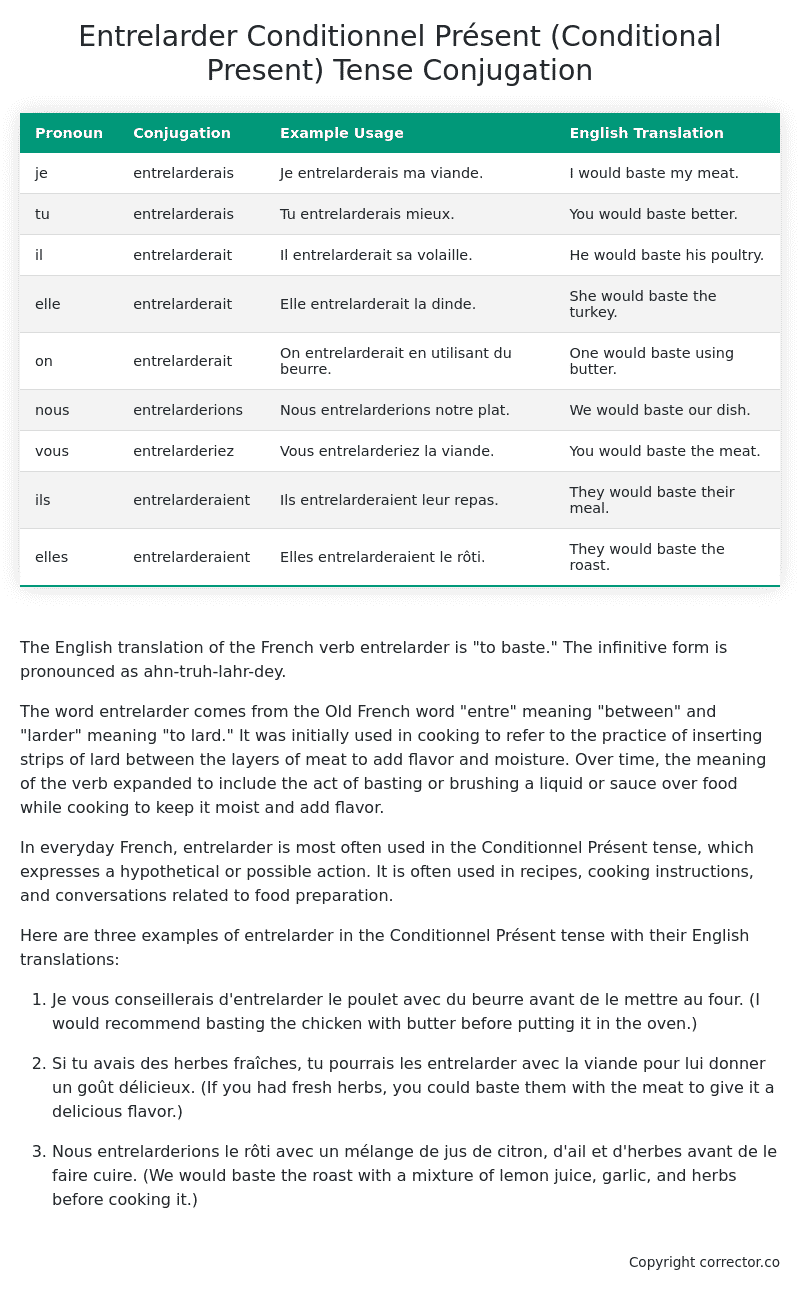Conditionnel Présent (Conditional Present) Tense Conjugation of the French Verb entrelarder
Introduction to the verb entrelarder
The English translation of the French verb entrelarder is “to baste.” The infinitive form is pronounced as ahn-truh-lahr-dey.
The word entrelarder comes from the Old French word “entre” meaning “between” and “larder” meaning “to lard.” It was initially used in cooking to refer to the practice of inserting strips of lard between the layers of meat to add flavor and moisture. Over time, the meaning of the verb expanded to include the act of basting or brushing a liquid or sauce over food while cooking to keep it moist and add flavor.
In everyday French, entrelarder is most often used in the Conditionnel Présent tense, which expresses a hypothetical or possible action. It is often used in recipes, cooking instructions, and conversations related to food preparation.
Here are three examples of entrelarder in the Conditionnel Présent tense with their English translations:
-
Je vous conseillerais d’entrelarder le poulet avec du beurre avant de le mettre au four. (I would recommend basting the chicken with butter before putting it in the oven.)
-
Si tu avais des herbes fraîches, tu pourrais les entrelarder avec la viande pour lui donner un goût délicieux. (If you had fresh herbs, you could baste them with the meat to give it a delicious flavor.)
-
Nous entrelarderions le rôti avec un mélange de jus de citron, d’ail et d’herbes avant de le faire cuire. (We would baste the roast with a mixture of lemon juice, garlic, and herbs before cooking it.)
Table of the Conditionnel Présent (Conditional Present) Tense Conjugation of entrelarder
| Pronoun | Conjugation | Example Usage | English Translation |
|---|---|---|---|
| je | entrelarderais | Je entrelarderais ma viande. | I would baste my meat. |
| tu | entrelarderais | Tu entrelarderais mieux. | You would baste better. |
| il | entrelarderait | Il entrelarderait sa volaille. | He would baste his poultry. |
| elle | entrelarderait | Elle entrelarderait la dinde. | She would baste the turkey. |
| on | entrelarderait | On entrelarderait en utilisant du beurre. | One would baste using butter. |
| nous | entrelarderions | Nous entrelarderions notre plat. | We would baste our dish. |
| vous | entrelarderiez | Vous entrelarderiez la viande. | You would baste the meat. |
| ils | entrelarderaient | Ils entrelarderaient leur repas. | They would baste their meal. |
| elles | entrelarderaient | Elles entrelarderaient le rôti. | They would baste the roast. |
Other Conjugations for Entrelarder.
Le Present (Present Tense) Conjugation of the French Verb entrelarder
Imparfait (Imperfect) Tense Conjugation of the French Verb entrelarder
Passé Simple (Simple Past) Tense Conjugation of the French Verb entrelarder
Passé Composé (Present Perfect) Tense Conjugation of the French Verb entrelarder
Futur Simple (Simple Future) Tense Conjugation of the French Verb entrelarder
Futur Proche (Near Future) Tense Conjugation of the French Verb entrelarder
Plus-que-parfait (Pluperfect) Tense Conjugation of the French Verb entrelarder
Passé Antérieur (Past Anterior) Tense Conjugation of the French Verb entrelarder
Futur Antérieur (Future Anterior) Tense Conjugation of the French Verb entrelarder
Subjonctif Présent (Subjunctive Present) Tense Conjugation of the French Verb entrelarder
Subjonctif Passé (Subjunctive Past) Tense Conjugation of the French Verb entrelarder
Subjonctif Imparfait (Subjunctive Imperfect) Tense Conjugation of the French Verb entrelarder
Conditionnel Présent (Conditional Present) Tense Conjugation of the French Verb entrelarder (this article)
Conditionnel Passé (Conditional Past) Tense Conjugation of the French Verb entrelarder
L’impératif Présent (Imperative Present) Tense Conjugation of the French Verb entrelarder
L’infinitif Présent (Infinitive Present) Tense Conjugation of the French Verb entrelarder
Struggling with French verbs or the language in general? Why not use our free French Grammar Checker – no registration required!
Get a FREE Download Study Sheet of this Conjugation 🔥
Simply right click the image below, click “save image” and get your free reference for the entrelarder Conditionnel Présent tense conjugation!

Entrelarder – About the French Conditionnel Présent (Conditional Present) Tense
Formation
Common Everyday Usage Patterns
Expressing Polite Requests
Expressing Hypothetical Situations
Expressing Doubt or Uncertainty
Interactions with Other Tenses
Present Tense
Past Tense
Future Tense
Conditional Perfect
Summary
Want More?
I hope you enjoyed this article on the verb entrelarder. Still in a learning mood? Check out another TOTALLY random French verb conjugation!


